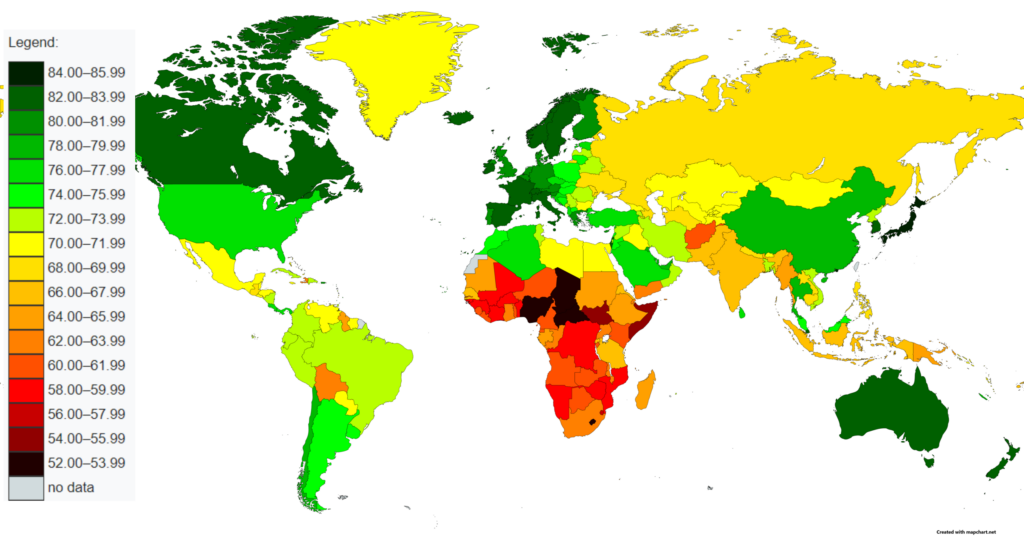Africa's Population
Africa is often referred to as the cradle of mankind. Scientists agree that the first humans probably appeared in Africa 4 million years ago and from there spread to other continents.
About 1.2 billion people live in Africa today. By 2050 the population of the continent is expected to double. Africa is the continent with the highest birth-rates and strongest population growth. This is because medical aid is getting better, there are more hospitals and doctors who take care of the population. Compared with other continents the average life expectancy in Africa is still low. In some countries of central Africa people barely reach 60.

Life expectancy in Africa
Image (modified) :Lady3mlnm, CC0, via Wikimedia Commons
Africa’s population is unevenly distributed over the continent. Many parts of the Sahara desert and the tropical rainforest are sparsely inhabited. On the other hand, the Nile Delta, the Mediterranean coast, Nigeria, the highlands of eastern Africa are densely populated. On average, about 65 people live on 1 square mile.
Many people in Africa suffer from a shortage of food, droughts, poor sanitation and a series of tropical diseases. In addition, AIDS is widespread and the biggest single killer of the continent.
Tribal groups
The people in Africa belong to various cultures and have different social backgrounds. Arabs live in the Mediterranean countries of northern Africa. They came to the region at around 600 A.D. and blended in with the Berbers, the people who had already been living there.
Black Africans are in the majority south of the Sahara desert. These people are made up of thousands of different tribes, who speak over a thousand languages and have different traditions and cultures. Among the largest groups are the Yoruba of Nigeria and the Zulu of South Africa.
In the 17th and 18th centuries Europeans started to settle in the southern part of Africa. Especially the Dutch and the British found their way to the coast of the southern Cape and spread inwards. There they met native tribes and fought wars against them. During the colonial period of the 19th century millions of Europeans made their way to Africa, many of them stayed there. Asians, above all Indians, settled on the eastern coast and Madagascar.
|
Nomads in northeastern Africa |
Yoruba drummers in Nigeria |
Religions
There are hundreds of local religions spread across the African continent. Many native tribes pray to gods and other spirits, mostly to get a good harvest and stay in good health. Some religious ceremonies prepare young people for adulthood and marriage.
About 500 million Muslims live in Africa, especially in the Arab countries of the north. But also Nigeria, Somalia and Tanzania have strong Islamic groups. Christianity spread to Africa through the work of missionaries from Europe and North America. Today, Christianity is dominant in the non-Arab countries south of the Sahara desert. Nigeria, the most populous country in Africa also has the largest number of Christians (about 80 million) on the continent. Copts are the native Christians in Egypt. They represent about 10% of the population there.

Religions in Africa
Image: derivative work: T L Miles (talk) / uploader of original revision of Religion_distribution.png was Moshin,
Public domain, via Wikimedia Commons
Life in Traditional African Societies
Before the Europeans came to the continent Africans lived in various traditional societies. Some gathered food and hunted wild animals. Others raised cattle on the grasslands south of the Sahara. In the tropical rainforest people slashed and burned down trees to prepare the area for farming. After a few years of growing crops they moved on and burned down the next patch of land. This method of shifting cultivation is still widespread in central Africa. On rivers and coasts people made a life by fishing and net making.
Today's Society
Although most Africans still live in rural areas, cities are growing fast, mostly because many people do not have jobs in the countryside and move to the urban areas to find more opportunities and a better life. Today, about 50% of the population lives in cities. Lagos, Nigeria, Kinshasa (Democratic Republic of Congo) and Cairo, Egypt are among the fastest growing cities in the world.

